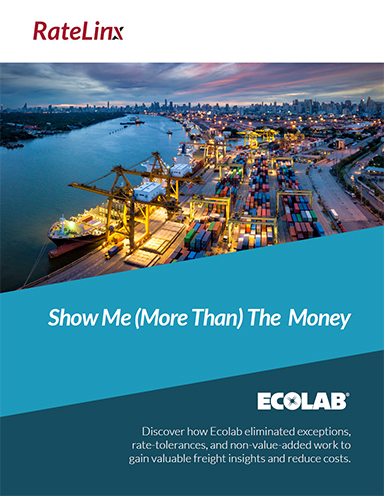Focusing on Transportation Costs Instead of Manually Resolving Freight Exceptions
Show Me (More Than) The Money: In this case study, discover how Ecolab, one of the largest water, hygiene, and energy technology and service businesses in the world, eliminated exceptions, rate-tolerances, and non-value-added work to gain valuable freight insights and reduce costs.
Big Data Hits Freight Audit Industry
The freight payment sector historically has been guided by a single, straightforward mission: Process and audit incoming invoices to eliminate shipper billing errors.
But a confluence of market and technology trends is broadening that mandate.
As freight management software becomes more sophisticated and supply chains grow more complex, new opportunities for utilizing data-driven processes to reduce transportation spend are opening up, helping shippers gain more insight into short- and long-term transport trends, as well as their organizations’ overall financial performance.
Problems With the Traditional Freight Audit Process
The traditional freight audit process is ill-equipped to make more than a dent in those losses.
One reason is that freight auditing is still largely a manual process and not only painfully slow but also riddled with potential for human error.
To avoid adding even more man-hours, many shippers deliberately overpay or spend more than their competitors.
Case Study: Ecolab
Ecolab is one of the largest water, hygiene, and energy technology and service businesses in the world.
A few years ago, the company decided to upgrade its legacy freight payment system.
The goals included automating manual processes, making accurate, timely payments (to become a Shipper of Choice), and beginning to understand how leveraging their freight spend data could yield broader supply chain efficiencies.
The RateLinx Solution
The RateLinx solution provides critical analytics to show how companies can save money, organized around three key metrics:
- Lost Savings
- Potential Savings
- Actual savings
The Results
Once the system was installed, Ecolab was able to reduce its rate tolerance from a $5 to $10 variance per shipment down to $0.01.
RateLinx also accommodated Ecolab as the logistics team continued the transition away from manual labor.
RateLinx also created regional views tailored to the team that is responsible for a given carrier, mode, and geography.
What’s Related




Favorites





